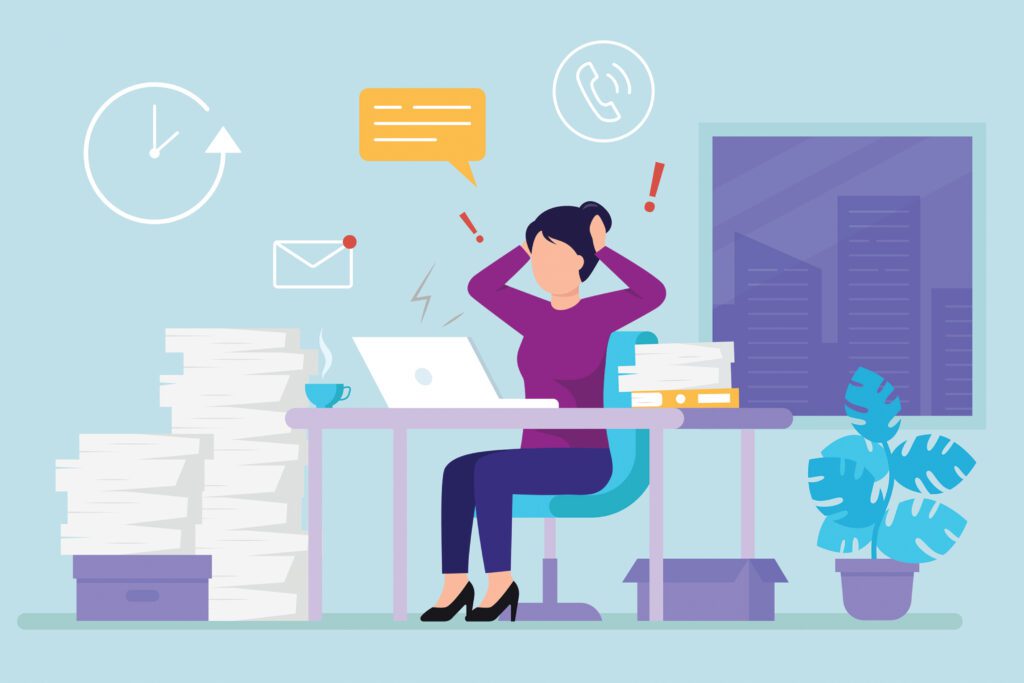As the clever quip suggests, “You can do anything but not everything.” Unfortunately, in today’s society, women are expected to be everyday superheroes with fulfilling careers, perfect kids, and spotless homes. These ever-mounting pressures are causing women to feel stressed out on a consistent and alarming basis. And what’s worse? Excessive stress can begin to affect your body in a multitude of worrisome ways. But, while there’s no way to eliminate stress entirely, there are ways to manage it and set yourself up for success. You’ve earned it, after all!
Understanding Stress

Stress is both a physical and mental reaction to a perceived pressure or threat. It may cause us to feel tense, nervous, or on edge, and can trigger a surge of adrenaline that can temporarily affect our nervous systems. Of course, a certain amount of stress in life is normal and expected. Elizabeth Kabalka, executive director of the Center for Mindful Living, explains, “Stress becomes ‘bad’ for us when we chronically feel that we don’t have the ability to meet the demands being asked of us.” When stress reaches these levels, it can lead to emotional and physical disorders like depression, anxiety, heart attack, stroke, hypertension, and more.
Stress and Gender


If men are from Mars and women are from Venus, it’s evident Venus is one big ball of stress. According to a study led by the University of Cambridge and funded by the National Institute for Health Research, women experience stress, anxiety, and depression nearly twice as much as their male counterparts. In addition, women are more likely than men to report physical and emotional symptoms of stress. “Women tend to perceive stress differently than men and therefore process and manage it differently. This is partly due to their unique biology as well as their psychological makeup,” says Dr. Melisa Couey, a physician with Parkridge Medical Group – Behavioral Health Partners.
While not the only factor, women’s hormones can affect stress levels. Dr. Couey shares, “Women experience much more hormonal fluctuation than men in general. Stress can alter the way these hormones shift, and chronic stress can interfere with the normal fluctuations that should be taking place, leading to further health consequences.”
Familial duties up the ante as well. Researchers have found that women aged 35-44 who are juggling a plethora of family responsibilities, such as caring for children and perhaps elderly parents, suffer higher levels of stress than any other age group. However, women of any age can experience stress in their everyday lives. “Stressors often depend on the woman’s particular life stage,” says Dr. Couey. “I frequently hear difficulty balancing work and home life. In young college women, it tends to be managing school-related stressors and balancing academics with leisure and extracurricular activities. Essentially, it’s ‘How do I do all the things I enjoy while also working to support myself (and perhaps my family) and maintain healthy relationships.’”
In a study conducted by the American Psychological Association, data revealed that women are more likely than men to say that having a good relationship with their families and friends is important to them. Women are also more likely to feel upset, conflicted, or stressed out if their personal relationships are strained or suffering.
The Effects of Stress on Your Body
When a woman’s body reacts to stressors, it releases hormones like adrenaline and cortisol. Too much cortisol is dangerous because it negatively impacts the immune system, digestive system, skin, and more. In other words, stress can impact nearly every system of the female body. Women who struggle with stress or anxiety are likely to experience some of the following symptoms:
Headaches
Stress is the most common cause of tension headaches. It can also cause migraines and make other headaches worse.
Irregular Periods
Stress can severely alter the body’s hormone balance, leading to missed, late, or irregular periods. In fact, women in stressful jobs are at a 50% higher risk for short cycle length (less than 24 days) than women who do not work in high-stress positions.
Hair Loss
Significant emotional or psychological stress can cause your hair to stop growing as the body dedicates its efforts to surviving the stressful event. Fortunately, stress-induced hair loss or hair thinning is typically not permanent.
Depression
Elevated levels of cortisol resulting from long-term chronic stress or acute stress rooted in a difficult life event like death or divorce can act as a trigger for depression.
Insomnia
Not surprisingly, stress is a common cause of insomnia, which can, in turn, lead to difficulty concentrating, irritability, and a lack of motivation.
Changes in Weight
High stress levels are correlated with increased appetite and sugar cravings. Additionally, studies have found that stress can actually alter the way your body metabolizes fat and sugar.
Managing Stress
“The obvious fundamentals that help us feel like we can physically meet the challenges of life include moderate, regular physical exercise, eating healthy foods, and taking care of our bodies. But, maintaining good mental health is just as important and often gets overlooked,” says Kabalka. Fortunately, there are steps you can take to reduce both the physical and emotional symptoms of stress.
Positive self-talk.
Talk to yourself using positive phrases such as “I’ll do the best I can,” instead of “I can’t do this,” or “I know how to deal with this, I’ve done it before,” instead of “I hate when this happens.”
Track your stressors.
Consider keeping a journal for a week or two, consistently recording your activities and interactions to identify the circumstances that might be causing you stress. Also share how you reacted. Taking notes can help you find patterns to avoid in the future.
Recognize when you need more help.
If problems feel insurmountable, talking to a psychologist, social worker, or counselor can help.
Find pleasure in an activity.
Take a walk in nature, start an art project, or identify another activity to take your mind off your daily stressors, even if just for a little while.
Carve out time for daily relaxation.
“Exercises like yoga, tai chi, and Pilates are especially helpful in managing anxiety and relieving stress,” recommends Dr. Goyne.
Connect with others.
“Having a network of friends and family who understand what you’re going through and whom you can talk to is extremely beneficial for stress reduction,” says Dr. Goyne.
Sleep more.
Aiming for eight hours of sleep a night remains a pillar of good health. When your body is stressed, it needs additional sleep and rest to better repair itself.
Stress of any kind can feel exhausting and overwhelming at times. That’s why it is important to identify the root of the issue. Is it work, a personal relationship, school, or something else? Once you have acknowledged your stressors, you can better learn how to manage them. Understanding your stress is key to living a happier and healthier life — which you deserve!


Dr. Elizabeth Kabalka
Executive Director, Center for Mindful Living


Dr. Melisa Couey
Physician, Parkridge Medical Group – Behavioral Health Services


Dr. Kathleen Goyne
Psychiatrist, Tennova Healthcare

